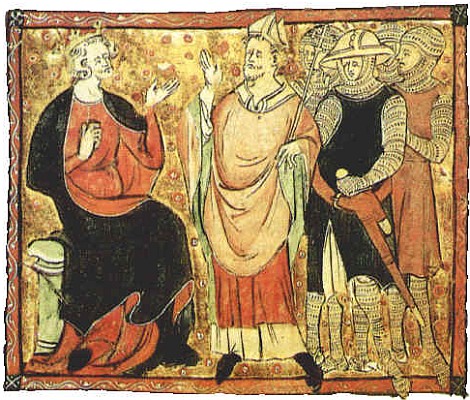
Friday
Washington Post’s Michael Gerson, no friend to either Donald Trump or Democrats, has just evoked T. S. Eliot’s Murder in the Cathedral to predict that the president will be impeached.
With the release of the whistleblower’s report, along with the rough transcript of Trump’s phone call to Ukraine’s president, Gerson believes that that wheel of fate has been set in motion.
While Gerson sees impeachment as warranted, he’s not sure it will work. It could even backfire. As events have unfolded, however, he believes it no longer matters what anyone thinks. Affairs have proceeded beyond any individual act of will.
In making his case, Gerson first notes Trump has clearly committed impeachable acts:
There is now no question that Trump asked the leader of a foreign country to investigate Joe Biden and his son — a request that was made in the context of a broader discussion of U.S. aid to Ukraine. This was the use of American power and diplomacy, not to serve the interests of the country, but for personal and selfish gain. It constitutes corruption of the first order.
Second, he observes that impeachment may not be a good idea:
Impeachment may be inadvisable. It may apply a cheese grater to the nation’s partisan wounds. The process may be conducted foolishly. It may feed a Republican thirst for revenge against a future Democratic president. It may motivate Trump’s base to salivating enthusiasm. The broad, American middle may yawn and switch to ESPN.
Third, however, “it matters like a fate, not a choice”—which is to say, at this point there’s nothing anyone can do about it. Gerson turns to Eliot to explain:
All of this matters, especially if it increases the chances of Trump’s reelection. But it matters like a fate, not like a choice. In T. S. Eliot’s Murder in the Cathedral, a priest says of unfolding events, “Let the wheel turn.” Archbishop Thomas Becket later comments: “The fool, fixed in his folly, may think/ He can turn the wheel on which he turns.”
I suspect the religious Gerson turned to the play because it captures his fatalism about the world. Everyone knows from the first that Thomas A. Becket, Archbishop of Canterbury, is not long for this world. At odds with former friend and ally Henry II, he faces death threats upon returning to England after seven years of exile in France.
The long time away, however, prompts a desire that issues be brought to a head. Or as Prufrock would say, that the moment be forced to its crisis:
Third Priest: For good or ill, let the wheel turn.
The wheel has been still, these seven years, and no good.
For ill or good, let the wheel turn.
Trump hasn’t been president for seven years, but it feels as though he has, and Gerson notes that someone has to stand up and oppose him. After all, “Trump believes that politics, stripped of pretense, is the dirty, unethical pursuit of power, which is properly used to destroy your enemies.” His modus operandi is to test every boundary of “morality and legality” while radically redesigning public life. In the end, Gerson believes, the Democrats had to start the wheel rolling, just as Becket has to return to Canterbury.
It’s a wheel Speaker Nancy Pelosi resisted for as long as she could, preferring a process she could control to one she couldn’t. Eventually events forced her hand, however. She may take some comfort from Becket, who says that we must abandon illusions of control:
We do not know very much of the future
Except that from generation to generation
The same things happen again and again.
Men learn little from others’ experience.
But in the life of one man, never
The same time returns. Sever
The cord, shed the scale. Only
The fool, fixed in his folly, may think
He can turn the wheel on which he turns.
Our only choice now, Gerson says, is choosing which role to play in the impeachment drama:
No one in our unfolding drama can now turn the wheel on which they turn. Trump’s clearly impeachable offense has given the partisan instincts of elected Democrats the added justification of principle. The whistleblower complaint has affirmed those concerns and expanded their scope. This makes the process of impeachment inevitable. Now the actors are merely choosing what roles they will play.
Gerson’s fatalism arises from Trump corrupting his beloved Republican party. Perhaps he finds solace in Eliot’s vision of principled martyrdom. Once caught up in the tug and pull of daily politics as a George W. Bush speechwriter, Gerson is no longer taken seriously by Republicans and so has opted for a detached long view. The world, for him, has become a stage with all the men and women merely players.
Democrats like Pelosi can’t afford Gerson’s fatalism. The wheel metaphor isn’t useful to them because, to the extent they can, they need to scope out the future. That’s how Pelosi managed to get Obamacare passed.
Yet Eliot’s vision still has something to teach them. With Trump trashing the Constitution and subverting elections, resistance has become their only viable response. Rather than figuring out their electoral prospects, they must stand up for their country as Becket stands up for his faith just before his assassination:
It is the just man who
Like a bold lion, should be without fear.
I am here.
No traitor to the King. I am a priest,
A Christian, saved by the blood of Christ,
Read to suffer with my blood.
Whether or not their impeachment efforts prove successful, Democrats at least must take a principled stand.

